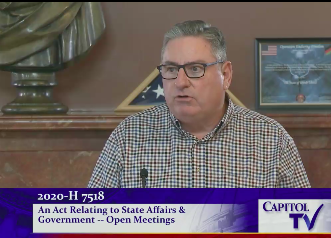PROVIDENCE – Rhode Island’s Open Meetings Act aims to ensure transparency in government, and dictates that the public has the right to participate in decision-making and witness the workings of government officials – except in certain cases where disclosure of a conversation would jeopardize a strategy, negotiation or investigation.
But when municipal boards spend hours in closed-door meetings, how can citizens know that’s all that’s being discussed?
Right now, technically, they can’t, say critics, and Rep. Brian Newberry has introduced a bill that could change that.
Newberry has submitted legislation that would strengthen OMA in the state by requiring that audio recordings be taken of all public meetings held in executive session.
The bi-partisan legislation, co-sponsored by Deputy Majority Whip Rep. Christopher Blazejewski, and has support from the American Civil Liberties Union and Common Cause RI.
“It makes it much easier than just relying on the minutes when audio is provided by the public body,” said John Marion, executive director of Common Cause. “There’s virtually no cost. This makes all the sense in the world.”
Many towns in Rhode Island already keep audio recordings of their executive session meetings voluntarily, and Newberry pointed out that several states already require it. The legislation, he noted, would not jeopardize town business by making information from the sessions public.
The audio records could, however, be reviewed by the state Attorney General’s office if the reason for the need for private session was ever brought into question.
“The idea is not to make the meeting open, public record,” said Newberry, who represents North Smithfield and a portion on Burrillville. “The idea is to give more tools to the Attorney General.”
Newberry told NRI NOW that he submitted the bill after speaking with a constituent.
The legislation was reportedly devised following conversation between the six-term representative and North Smithfield resident Michael Clifford regarding closed sessions held by the town’s Municipal Buildings Review Task Force.
Clifford noted that the task force, charged with overseeing the renovation of town buildings including the former Kendall Dean and Bushee Schools, met in executive sessions for more than three hours over the course of four meetings held over several months in late 2017, holding only 53 minutes of those same meetings in a forum where residents could listen and take part.
Exemptions cited for the closed sessions included, “potential litigation,” and “discussion of the matter of security.”
Clifford questioned the need for the lengthy private meetings, and submitted a complaint on the issue to the state Attorney General’s office. Currently, state law requires that boards meeting in closed session keep minutes of the meetings to establish a record of what was discussed, and his complaint triggered a review of the MBRTF’s submissions.
And the Attorney General’s office dismissed the complaint.
It’s a decision Clifford says would make a lot more sense if there was evidence in the form of recordings.
And while Newberry emphasized that he does not get involved in specific town politics or take sides in such disputes, the answer to the issue seems obvious.
“The Attorney General’s office processes complaints, and right now relies on meeting minutes,” Newberry said. “If there is a complaint there should be an audio recording of it.”
Clifford presented a list of reasons he feels that the MBRTF’s minutes were not an adequate account to members of the House Judiciary Committee at a hearing on House Bill 7518 last week.
He said that the minutes were submitted by MBRTF Chairman and Town Council President Paul Vadenais well after the legal deadline, and only produced after he requested them. He pointed out that the notes were never approved by the full board, and that individuals brought into the private meetings never included a lawyer, but did include an asbestos abatement specialist and an architect.
The state law dictates that “No public body shall discuss in closed session any public matter which does not fall within the citations.”
“I found it disheartening to believe that you could possibly make a rational decision as to whether or not there was a violation based solely on what one group writes in the minutes,” Clifford said. “Anybody can write anything on a scrap of paper. That doesn’t mean that’s what occurred.”
According to a recent survey compiled by the Narragansett town clerk, 11 communities in the state – including Burrillville – currently record meetings held in executive session.








